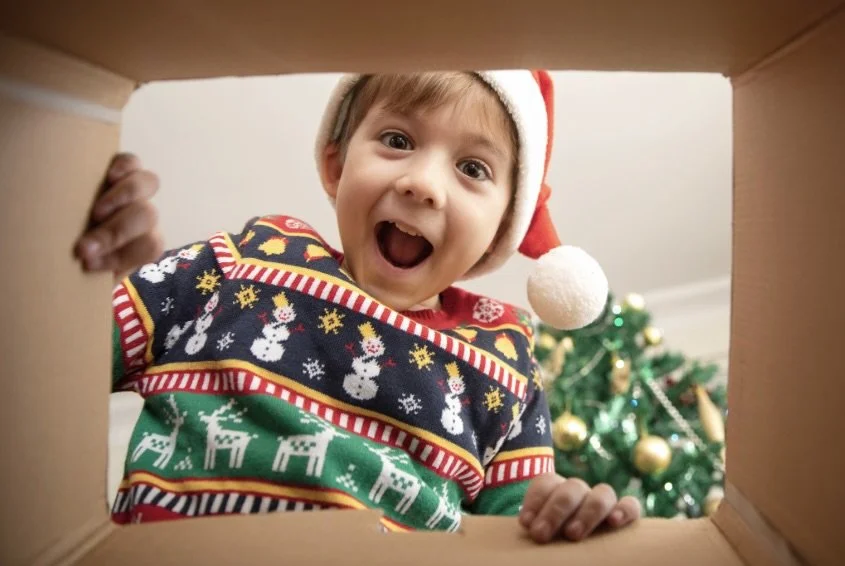Supporting Children with ADHD During the Festive Season
Child excited about Christmas
The festive season is often described as “the most wonderful time of the year” — a time filled with excitement, celebration, and togetherness. Yet for children and young people with ADHD, this time can also bring unique challenges. The holidays often mean changes in routine, increased sensory stimulation, and a whirlwind of social interactions, all of which can make it difficult to stay regulated and engaged.
Understanding these challenges and preparing ahead can make a huge difference in helping children and young people with ADHD thrive during this busy season. Here’s how families can support children to enjoy a calmer, more inclusive festive period.
1. Keep Some Structure
Although holidays naturally disrupt daily routines, maintaining a sense of predictability is key for children and young people with ADHD. Routine helps provide stability and reduces anxiety by letting children know what to expect.
Try to keep key daily activities—such as meals, sleep, and quiet time—at consistent times. You can also use visual schedules or simple checklists to outline the day’s events. Even a few predictable elements can help your child feel more grounded amid the holiday chaos.
2. Manage Sensory Input
The festive season is a sensory feast: bright lights, glittering decorations, bustling shops, new smells, and loud music. For many children with ADHD—especially those with co-occurring sensory processing differences—this can quickly become overwhelming.
Create a calm space where your child can retreat when things feel too intense. This might include noise-cancelling headphones or earphones, weighted toys, calming music, or a small box of favourite sensory tools. If attending large gatherings, schedule regular sensory breaks to prevent overload before it escalates.
3. Plan Transitions Carefully
Transitions—such as moving from home to a party, finishing one activity to start another, or even coming back from holiday break—can be particularly difficult for children with ADHD.
Provide advance notice of upcoming changes and use visual or verbal countdowns (e.g., “In 10 minutes, we’ll start getting ready to go”). An advent calendar is also a fun way to countdown to Christmas day itself.
Talking through what will happen next helps children mentally prepare and can reduce resistance or anxiety.
4. Choose Activities That Support Regulation
Not every holiday activity has to be loud or fast-paced. Integrating calming and sensory-friendly traditions can be both enjoyable and regulating. Some ideas include:
Baking or decorating Christmas cookies together
Making paper snowflakes or Christmas crafts
Taking a winter walk to look at lights
Watching a festive film with hot chocolate
Doing mindful colouring or simple yoga
These activities help children stay connected and regulated while still enjoying the spirit of the season.
5. Focus on Connection, Not Perfection
The festive season often comes with high expectations—perfect decorations, perfect photos, perfect behaviour. But for children with ADHD, focusing on connection rather than control can make a world of difference.
When we let go of perfection and embrace flexibility, we create space for joy and authenticity. Celebrate small successes, adapt traditions to fit your family’s needs, and remember that what your child will remember most is how you made them feel.
6. Communicate and Collaborate
If you’re visiting family or attending community events, communicate your child’s needs ahead of time. Let relatives or organisers know what helps your child stay calm and what might be challenging.
A Gentle Reminder
The festive period can amplify both the joys and challenges of supporting a neurodivergent child. While there will be moments of excitement and happiness, there may also be times of fatigue and overwhelm—and that’s okay.
By understanding a child’s unique sensory and emotional needs, we can create spaces that promote calm and connection. Remember, every small adjustment adds up: a predictable schedule, reduced sensory load, and empathy can transform a potentially stressful time into a meaningful one.
Final Thought
Every child deserves a Christmas that feels comfortable, not overwhelming. For children and young people with ADHD, the holidays can be magical—with the right support.
By focusing on structure, sensory awareness, and emotional connection, we can make the festive season inclusive, joyful, and stress-free for all.
Blog contains affiliate links
